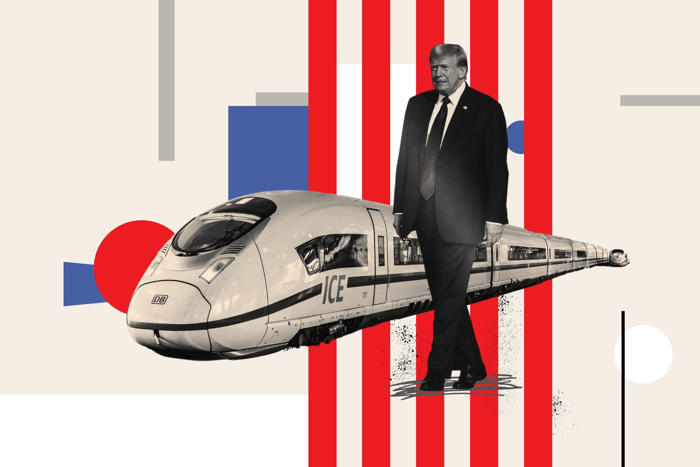Donald Trump Could Derail High-Speed Rail Revolution

Donald Trump Could Derail High-Speed Rail Revolution
A second Donald Trump presidency could be "the death knell for high-speed rail" in the United States, according to Ray LaHood, who served as Transportation Secretary from 2009 to 2013 in the Obama administration.
Speaking to Newsweek, LaHood, who now chairs the U.S. High-Speed Rail Coalition advocacy group, said the country is taking steps towards an integrated high-speed rail network, but a Republican White House victory in November could jeopardize this.
High-speed rail has undergone something of a renaissance in the U.S. over the past few years with a number of lines either under construction or being proposed. In California, a new 171-mile line connecting Los Angeles to San Francisco is currently being built, and in April work began on a 218-mile line linking Las Vegas in Nevada to southern California. There are also several proposed routes under discussion including two lines that would connect Dallas to both Houston and Fort Worth in Texas, though neither has been approved.
LaHood said: "I believe that if President Trump is elected again that will be the death knell for high-speed rail because generally Republicans have not really believed in making the investment in high-speed rail."
"The only thing that could stop that is if you had a Congress who really put together a high-speed rail plan for America and funded it. That would override or supersede any administration."
LaHood noted some Republicans do support high-speed rail but said they are generally more skeptical "because it's an idea that was started by Obama and Biden" and as "they'd rather invest in roads and bridges."
Newsweek contacted Donald Trump's presidential campaign for comment via email.
LaHood argued a historic lack of investment is the reason the U.S. doesn't have a high-speed rail network comparable to those of Japan, western Europe and China, and compared the effort needed to the Eisenhower administration's construction of the interstate highway network.
He said: "The U.S. government, the political people in America—from the administrations previously to this one—have never made the investment. When you look at the investment that has been made in China, Japan, and Europe, high-speed rail is very expensive and it can't just be done with private dollars. But when the national government gets involved—what happened in our country, when Eisenhower was president in the 50s, his vision was a roadway to connect America and now, 50 years later, we have the interstate system."
LaHood attributed the current boom in U.S. high-speed rail to decisions made by presidents Obama and Biden, citing the former's American Recovery and Reinvestment Act of 2009 and the latter's $1 trillion infrastructure package that was signed into law in 2021.
Referring to federal support for high-speed rail, he said: "The first time it ever happened is during President Obama's administration in the first 30 days when he was president in 2009."
LaHood mentioned the Obama administration's $831 billion stimulus package in response to the Great Recession in 2009, stating that "$48 billion of that was for infrastructure and of that, 8 billion was for high-speed rail. That's the first time in the history of America that 8 billion dollars was ever set aside for high-speed rail and President Obama gets the credit for it."
LaHood said: "The current President Biden got Congress to pass a trillion dollar transportation bill, the largest transportation bill in the history of the country, and 66 billion dollars is going for rail because Biden is a big rail guy. He believes in high-speed rail and he just announced $3 billion for the Las Vegas to Los Angeles [line] and $3 billion for San Francisco to LA. Now that's the kind of commitment from the national government that is going to enable America to get into the high-speed rail business."
The former transportation secretary urged both Democrats and Republicans in Congress to develop "a countrywide plan for implementing [high-speed] rail in America" and put the requisite money behind it, which he said could lead to a "comprehensive" high-speed rail network across the country in 30-50 years.
A survey conducted earlier this month for Newsweek found that 60 percent of eligible U.S. voters back the construction of new high-speed rail lines in America, against just seven percent who are opposed.
However, when told the estimated cost for phase one of California's high-speed rail project which will go from San Francisco to Los Angeles has increased from $33 billion to $128 billion, the proportion of voters who said it would be "worth it" fell to 40 percent, with 33 percent disagreeing and 27 percent unsure.
Start your unlimited Newsweek trial
